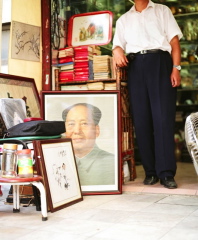
13 June 2006 — The rabbi also urged China to restore the Ohel Rahel synagogue in Shanghai, which is currently among a number of religious buildings being used for government purposes.
Amar told reporters: “I have come here to strengthen the community here, to aid spiritual growth, and to pray for the government to allow freedom of religion for the Jews.”
He also led prayers at the site of the historic synagogue in Shanghai, which was built in the 1920s.
Jewish settlers in China are documented as early as the 7th century CE, but by the time the People’s Republic of China was established in 1949, few native Chinese Jews were known to have maintained the practice of their religion and culture.
However small communities survive today, and synagogues remain in Beijing, Shanghai, and the special administrative region of Hong Kong. Last year, the Israeli embassy to China held their Hanukkah celebrations at the Great Wall of China.
The academic study of Judaism and Jews in China has also blossomed in recent years. But China’s religion policy requires recognition and registration, and at present the state acknowledges only five faiths: Protestantism, Catholicism, Buddhism, Taoism and Islam.
This poses a great problem for the development of Jewish life, says Rabbi Amar. It effectively makes Jewish religious gatherings illegal – though often ‘beneath the radar’, given the preoccupation with larger religious ‘sects’, including the Falun Gong.
The Chinese government’s policy is for the ‘managed growth’ of religion as a social cement in society. But it rigorously opposes too much independence of religious bodies and overseas interference.
There are a substantial number of unofficial churches and other groups, in addition to the officially accepted faith organisations.
© 2006 Ekklesia. Posted on Religioscope with permission. An initiative of the Anvil Trust, Ekklesia is a not-for-profit think-tank which works to promote theological ideas in the public square. Website: www.ekklesia.co.uk